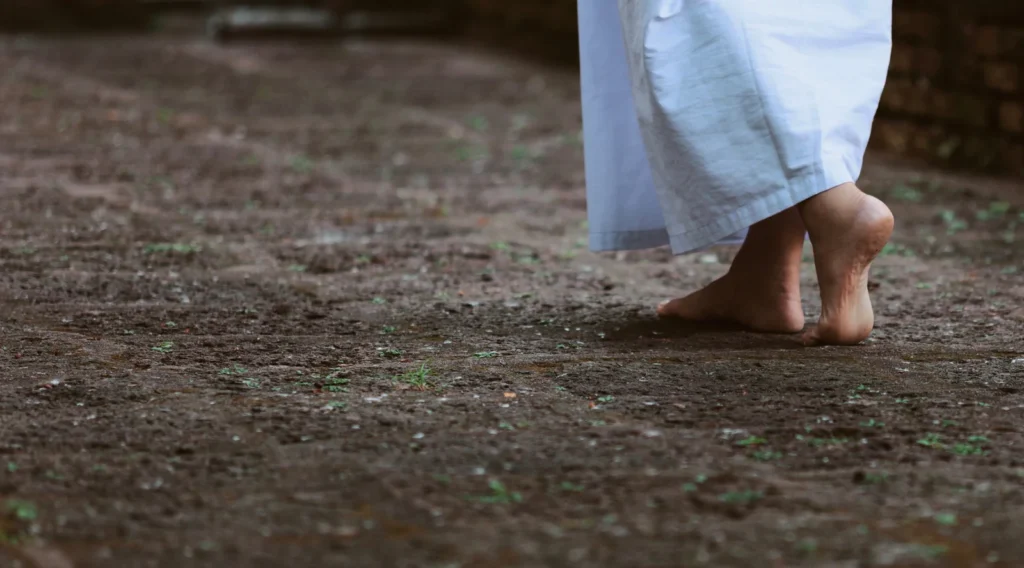Indulging in the contemplation of self-improvement and personal growth often leads us to the profound concept of being ‘grounded’. As an idea entrenched in the pursuit of emotional peace and mental clarity, grasping its depth requires gleaning through cultural understanding, sifting through scientific studies, and delving into personal experiences.
In this article, we will embark upon a comprehensive exploration of what it truly means to be grounded, why it’s pivotal for our well-being, and how we can incorporate grounding practices into our daily lives. As we navigate through life’s tumultuous seas – braving storms of stress, anxiety, fear and uncertainty – being grounded serves as an anchor that keeps us steady.
It is this steadfast resilience that grants us better control over our responses to life’s trials and tribulations. Thus, understanding grounding becomes indispensable for fostering emotional stability amidst chaos.
A Closer Look at Grounding: Defining the Concept
The term ‘grounded’ is replete with nuanced interpretations that vary across disciplines yet converge towards a common essence – stability. In psychology parlance, being grounded refers to having a balanced connection between one’s physical existence and mental state. It represents an equilibrium where one is firmly rooted in reality; cognizant of their feelings yet detached from frivolous ripples engendered by fleeting emotions or circumstances.
In spiritual realms or energy healing modalities like yoga or reiki, being grounded often denotes aligning oneself with Earth’s energies. This association symbolizes drawing nourishment from Mother Nature herself to foster internal balance while releasing surplus energy back into the earth – culminating in a sense of strength akin to an ancient tree standing tall against winds yet deeply connected with the soil beneath.
Unearthing Benefits: The Importance of Being Grounded
The significance of being grounded transcends beyond anecdotal claims and comes bolstered with tangible benefits spanning across both physical health and psychological well-being spectrums.
From enhancing focus & decision-making abilities — quintessential cognitive skills needed for professional success—to fortifying emotional resilience against stressors thereby boosting mental health; grounding exudes far-reaching implications on personal development frontiers.
Beyond personal growth realms; scientists have discovered fascinating links between physiological processes like inflammation reduction & improved sleep quality with grounding activities such as walking barefoot on earth—referred as ‘earthing’.
Grounding also fosters stronger connections with others by empowering individuals to engage more empathetically due to their enhanced self-awareness & stable psychological state—thus contributing towards healthier relationships & harmonious social ecosystems.
The Roots of Grounding: Historical Perspective and Cultural Significance
Historically, the practice of grounding or earthing is as old as humanity itself. Indigenous cultures across the globe have inherently understood the importance of maintaining a profound connection with Earth.
Native American traditions, for example, placed great emphasis on barefoot walking and sleeping on the earth to attain spiritual insight and physical healing. In many Eastern philosophies such as Buddhism and Hinduism, grounding plays a key role in spiritual practices.
The chakra system in Hindu tradition identifies Muladhara or root chakra as a grounding force that enables stability and secure footing in one’s life. In essence, throughout time and space, being grounded has been universally interpreted as being profoundly connected to earth, embodying stability and promoting overall well-being.
Spirit Meets Science: Psychological and Physiological Aspects of Grounding
Psychologically speaking, grounding can be instrumental in managing stress levels, reducing anxiety, enhancing focus and improving sleep quality. When practiced regularly it can provide a sense of calm which can translate into better decision-making abilities resulting in increased productivity.
Physiologically speaking, studies suggest that direct contact with Earth’s surface impacts our health positively by stabilizing circadian rhythms–our internal biological clock–balancing hormone production processes like cortisol secretion which aids stress management.
It promotes cardiovascular health by improving blood circulation thereby reducing inflammation — one of the leading causes behind many chronic diseases today.
A Conscious Union: Relationship between Grounding and Mindfulness
The practices of mindfulness – deliberately focusing on present moment experiences without judgment – shares an intimate thread with being grounded. Both invite us to be fully present in the ‘now’, promoting emotional self-regulation while nurturing an inner stability amidst external chaos.
Mindfulness aids grounding by fostering awareness about our body’s connection with nature whereas grounding contributes to mindfulness through increased attentiveness towards our environment specifically earth’s energies underfoot or within reach which essentially brings mindful moments alive augmenting our overall experience.
The Science Behind Grounding
Unveiling Bioelectricity: The Vital Current Within
Unbeknownst to many, the human body operates much like an intricate electrical circuit. This phenomenon, known as bioelectricity, is integral to our existence and functioning. It is the force that drives our heartbeats, facilitates neural communication and governs cellular metabolism.
From the rhythmic pulsations of our hearts to the fleeting synapses in our brains, every biological process is a dance orchestrated by complex bioelectrical signals. The balance of this bioelectric current within us can be greatly influenced by external factors, including our interaction with the Earth’s electromagnetic field.
This interaction forms the premise of grounding and its potential benefits for health and wellbeing. Grounding essentially helps recalibrate our internal bioelectric environment by aligning it with Earth’s natural frequencies—a concept often referred to as “Earthing”.
Grounding and The Nervous System: A Harmonious Symphony
Our nervous system — an intricate network of nerves acting as biological superhighways — relies heavily on bioelectricity for its function. Each nerve impulse is a bioelectrical signal travelling at breakneck speed, facilitating everything from movement and sensation to complex thought processes.
Interestingly enough, grounding appears to have a profound impact on this electrical symphony within us.

When we physically connect with Earth—say by walking barefoot, walking meditation or using a grounding mat—our bodies absorb negative ions from Earth’s surface. These ions seem to pacify overactive nervous systems, reducing cortisol levels—the body’s primary stress hormone—and fostering a sense of calmness and tranquillity.
Evidence-Based Benefits: Grounded in Science?
In recent years, several studies have emerged supporting the potential health benefits of grounding practices. One study conducted in 2004 found that grounding during sleep improved sleep quality while reducing pain and stress among participants.
Another research published in 2015 suggested that regular grounding could help reduce inflammation—a root cause behind numerous chronic diseases—in addition to improving wound healing.
A review article published in 2012 also accentuated its potential benefits for cardiovascular health – suggesting that earthing could improve blood viscosity (a major risk factor for heart disease), thereby promoting better circulation.
While more comprehensive studies are needed before these effects can be universally substantiated, initial findings suggest promising avenues worth exploring further.
Misconceptions About Being Grounded : Unraveling the Inaccuracies
The concept of being grounded, while gaining increased recognition in recent years, is still a subject of various misconceptions. One prevalent myth is that grounding is an esoteric practice reserved for spiritual gurus and yogis.
Contrarily, grounding is an innate human capacity that can be cultivated by anyone irrespective of their spiritual inclinations.
It is an intrinsic connection to the Earth and oneself, which promotes mental clarity and physical well-being. Addressing the skepticism within some segments of the scientific community, it’s important to recognize that scientific exploration thrives on inquiry and skepticism.
Some experts question the impact of grounding due to limited empirical evidence or perceive it as placebo effect. However, multiple studies showcasing measurable physiological changes post-grounding practices are gradually dispelling these doubts.
Techniques to Become More Grounded: Embarking on a Journey Within
Grounding techniques traverse physical, mental and emotional dimensions. Physically connecting with Earth through barefoot walking or gardening facilitates absorption of natural electrons from Earth’s surface aiding in neutralizing free radicals. Yoga helps achieve balance and posture alignment thus enhancing groundedness.
Mental techniques such as meditation and mindfulness practices encourage awareness about present moment experiences fostering a sense of grounding.
Emotional techniques like EFT (Emotional Freedom Technique) use tapping on energy meridian points to release blockages promoting emotional equilibrium whereas journaling provides a medium for emotional expression contributing towards inner stability.
Role of Diet in Being Grounded: Nourishing Foundations
Diet plays an indispensable role in promoting groundedness. Foods grown beneath the earth’s surface like root vegetables notably enhance states of groundedness by providing dense nutrients & stabilizing energy levels.
Consuming warm foods & spices also fosters warmth & steadiness within body. Hydration plays an equally crucial role as water conducts electricity thus assisting in maintaining our body’s bioelectrical framework integral for grounding process.
Impact of Environment on Grounding: The Sanctuary Around You
Our environment deeply influences our state-of-being including our level of groundedness. Embracing nature by spending time outside routinely significantly boosts grounding effect owing to direct contact with earth elements.
Creating a nurturing space at home/work accentuated with elements like plants/earthy tones/nature sounds can facilitate maintaining consistent states of groundedness even within urban settings
Case Studies – Success Stories: Triumphs from Terra Firma
Countless individuals have experienced transformative effects via consistent practice of grounding techniques ranging from improved sleep patterns to enhanced cognitive functionality suggesting universal applicability & effectiveness across diverse demographic profiles.
However, understanding that each individual’s experience would be unique & subjective can prevent unrealistic expectations while starting this journey
Frequently Asked Questions about Being More Grounded: Quench Your Curiosity
Despite extensive discussions around benefits/applications etc., readers often have specific queries about certain aspects reflecting unique situations/personal concerns thus necessitating separate section addressing common FAQs adding value for anyone seeking deeper understanding
Challenges in Staying Grounded & Overcoming Them : Transform Barriers into Stepping Stones
Maintaining consistency amidst chaotic modern lives often emerges as formidable challenge; however recognizing that even simple alterations such as mindful breathing or consciously connecting with nature during routine activities like walking/driving could remarkably contribute towards achieving a more grounded state Another common obstacle is neglecting physical health; therefore prioritizing balanced diet/exercise/sleep regimen forms essential part towards building sustainable grounding habits
Conclusion – Embrace Serenity through Steadiness
The path towards becoming more grounded offers profound opportunities for self-discovery and growth. Facing its challenges head-on while harnessing its myriad benefits allows us to navigate life’s ebb & flow with grace, equanimity & resilience. Remember, “To touch the Earth is to have harmony with Nature.” – Oglala Sioux Proverb
If you’re interested in further exploring the art of becoming more grounded, I encourage you to check out this resource. I’ve personally found it to be highly beneficial in my own journey, and I believe it can add value to yours as well. Remember, every step, every tool, and every resource counts when it comes to personal growth and achieving that inner peace we all seek. Click here to discover more – trust me, you won’t regret embarking on this new path to grounding yourself.




























































